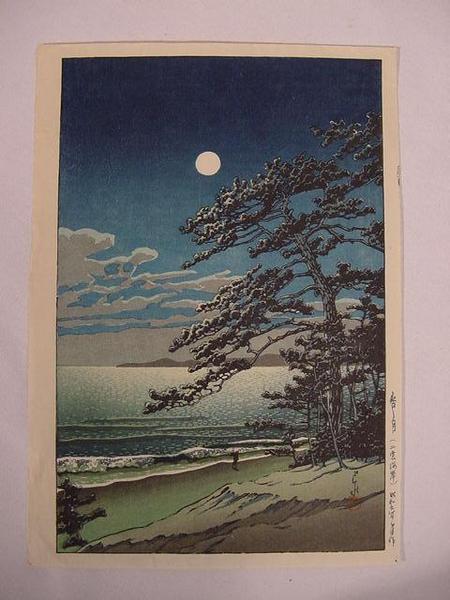Spring Moon at Ninomiya Beach
Artist: Kawase Hasui
Name: Spring Moon at Ninomiya Beach
Date: 1932
Description: This auction is for a Japanese woodblock print from the late, Ukiyo-e, (Floating World) Shin-Hango (New Print) era by the reknown master printmaker, Hasui Kawase, (1883 – 1957) born with the given name of Bunjiro. A year after his death he was declared a National Treasure by Japan. This particular print is titled “Moon at Ninomiya Beach”, oban, published by Doi Teiichi, in 1932. This is a lovely, night scene, which Hasui was most famous for. It depicts a small, solitary figure, under a full moon, walking along the edge of the sea. Moonlight reflection glistens off the top of the pines, & along the crest of the wave as it breaks on the shore. The palette is muted, in tints & shades of green, blue, & black. PAPER SIZE: 15″ x 10.75″ IMAGE SIZE: 14.25″ x10.5″ SIGNATURE: Artist chop, in red, & signature, in black, in the lower right corner. There is also script in the margin. (see photos #3 & #4) I am unable to read this. Whether it is the title, a poem, signature of the publisher, I cannot say. However, I’ve learned that at least part of this, if not all, may be the copyright mark. CONDITION: This print is in it’s “found state”. It came out of a box of Japanese prints at an estate auction of Orientalia collectors, who traveled to Japan several times. It was wrapped in tissue paper & again in heavier brown paper. I will describe the condition to the best of my ability. Please keep in mind that it did not come out of a museum flat file….. I see no major damage, that is, no tears to the piece. I see no stains, nor foxing, readily apparent to the naked eye. I cannot state that it has never been exposed to any sunlight. I see no evidence of it ever having been hinged, let alone framed, in it’s lifetime. I do note the following: There is a watermark in the paper, of parallel lines, & I also note the usual imperfections that occur in the making of handmade printmaking paper. There are small, light crimps, found mainly in the border, though some do extend into the image. These appear to be from the pressure of a press, or occurring in the print drying process of stacking between the heavier blotter paper, again under some pressure to keep the prints flat until dry, & are not uncommon for woodblock. I cannot say with 100% assuredness that they were all caused by that. However, none are dtracting from the aethetics, or value, of the print. There is no evidence of the piece ever having been folded, & it does appear to have been kept flat all these years. On the back of the piece, along the very bottom edge (see photo #6) is the following: in pencil – Ninomiya Kaigan; in ink – N984 – Hasui – 65.00; & again in pencil – P8. Catalogue, or index number? Dealer?


